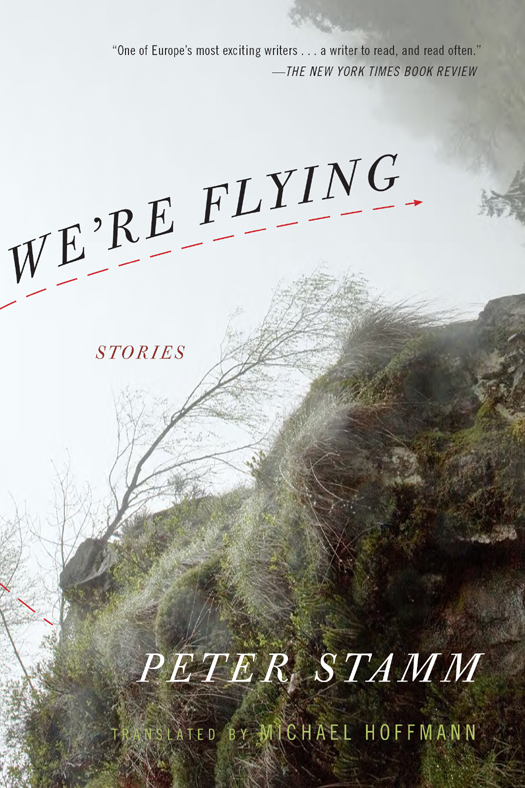
We're Flying
Stories
کتاب های مرتبط
- اطلاعات
- نقد و بررسی
- دیدگاه کاربران
نقد و بررسی

Starred review from June 18, 2012
The characters in Stamm’s generous new collection engage right away via their seeming transparency. No sense of author omniscience separates the reader from protagonists coping with issues large (the death of a spouse) or small (a bandage put on too tight). Often, issues begin as small annoyances that develop menacingly. In the title story, a day-care worker becomes increasingly frustrated when she’s forced to stay with a young charge whose affluent parent fails to pick him up. In the surprising “Children of God,” a young clergyman struggling to gain a foothold in his new rural parish encounters a pregnant woman who claims that she’s a virgin. “The Natural Way of Things” opens with the highly effective tease: “I’m not saying that they tricked us, said Alice, but they didn’t tell us the truth.” Stamm finds variety in setting and with characters of differing ages and social classes, and by writing in first, second, and third person in both past and present tense. More significantly, he connects so closely to the psyches of these individuals that his style becomes mutable, variously suggesting the eerie claustrophobia of Shirley Jackson, the brittle edge of Raymond Carver, and even the warmth of Lorrie Moore. Agent: Eva Koralnik, the Liepman Literary Agency.

Starred review from August 1, 2012
Beneath the surface placidity of Swiss life, undercurrents of spiritual turmoil and existential despair charge this powerful collection of provocative stories. Renowned in European literary circles, Switzerland's Stamm didn't achieve his stateside critical breakthrough until his last novel (Seven Years, 2011, etc.). This story collection is even better, with pieces that read like the Zurich equivalent of Camus or Kafka, occasionally laced with a bit of Ibsen or Ingmar Bergman. Not a lot happens in these stories and what does mainly takes place internally, in the psyches of characters who don't seem to have much control over their destinies or understanding of their motives and whose essential mysteries--to themselves and to the reader--could be described as the human condition. The American publication combines two separate story collections, the first published in 2008, the second in 2011, yet the stories themselves are timeless, like fables or parables, with the plainspoken translation reinforcing the stark, spare essence of the fiction. Some of these stories deal with the awkwardness of adolescence and sexual initiation, but the protagonists of many more are innocents as well. In "Children of God," the longest story here, a minister navigates between sin and divinity as he falls in love with a young girl who insists that her pregnancy is an immaculate conception. In the process, he consults a doctor, one who was "not even an atheist, he believed in nothing, not even that there was no God." The following story, "Go Out into the Fields...," concerns a landscape artist--identified in the second person as "you"--who learned to paint when "you learned to see," who "kept painting dusks, as if you wanted to stop time, to escape the certainty of death," and who approaches his work with "a passionate indifference." Another protagonist, a young girl who lives "In the Forest," survives through "alert indifference." Such a perspective might be considered Zurich Zen, and Stamm is its master. For those who have an affinity for metaphysical fiction written with a surgeon's precision, this collection will spur readers to seek out everything else by its author.
COPYRIGHT(2012) Kirkus Reviews, ALL RIGHTS RESERVED.

July 1, 2012
In his latest, Swiss writer Stamm (Seven Years) offers the reader insights into the human character, sometimes discomfiting and seemingly irrational but at the same time oddly familiar. A husband faced with his wife's probable slow death follows the hospital's instructions by packing a suitcase with items that his wife will clearly never use and then has no idea what to do with the suitcase. A writer looking for a quiet sanctuary to complete a work in progress takes a room in an abandoned hotel with no electrical power or running water and in which dinner consists of unheated, canned ravioli. A middle-aged, childless couple, worn down by habitual communication, find themselves confronted with a disruptive, ill-behaved family in the neighboring villa while on summer holiday and find themselves strangely aroused. VERDICT These tautly constructed stories, with echoes of such disparate authors as Patricia Highsmith and Anton Chekhov, take root in the psyche and will not let go.--Sue Russell, Bryn Mawr, PA
Copyright 2012 Library Journal, LLC Used with permission.

























دیدگاه کاربران